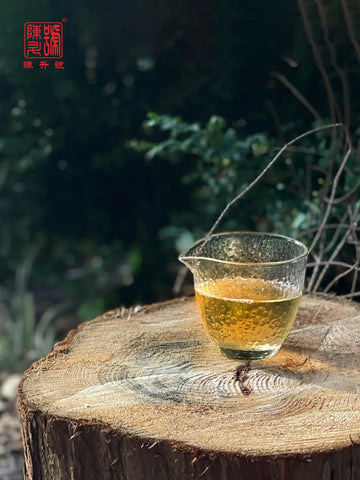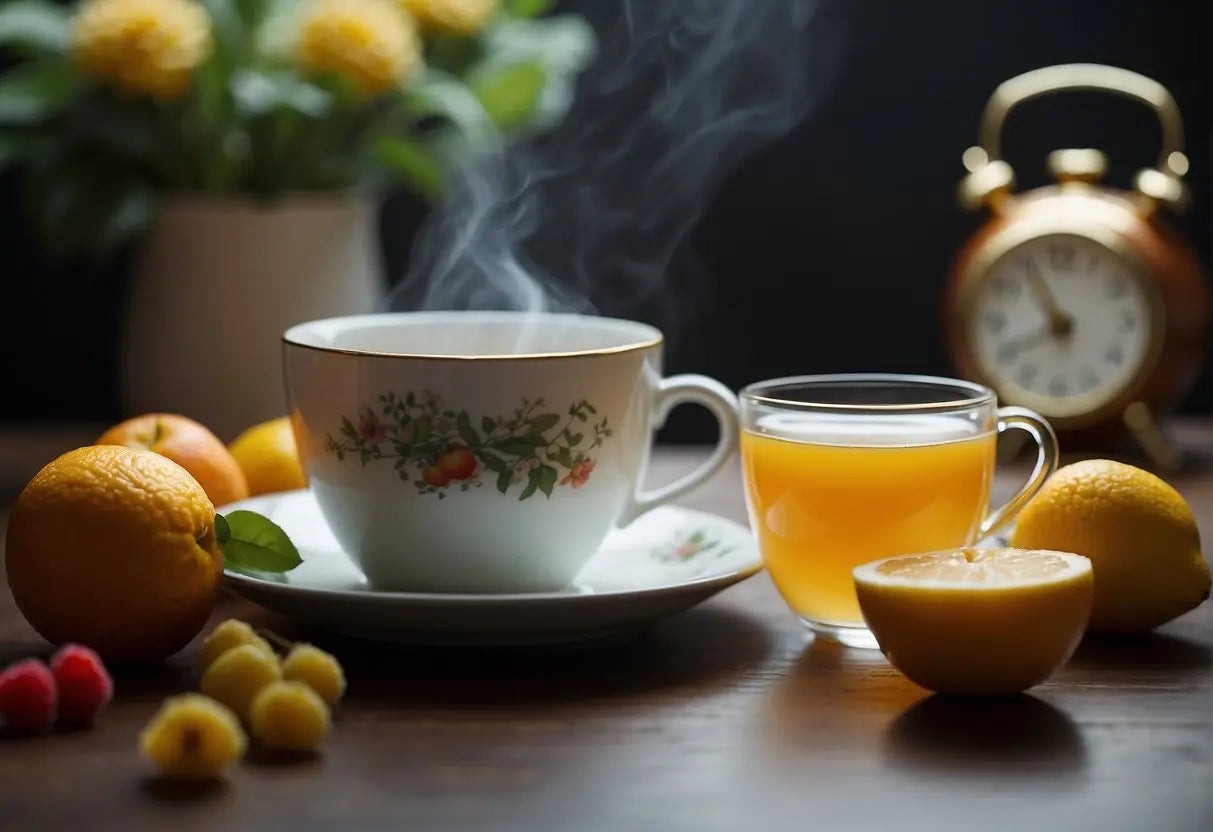When Fasting, Can You Drink Tea
Shop our Pu Erh Tea collections!
When you fast, understanding which beverages are permissible is vital for maintaining the integrity of your fast. Fasting protocols differ, so the allowance of certain drinks, like tea, can vary based on the type of fast you follow.
Religious Fasts: In many religious fasts, such as those in Islam (e.g., Ramadan), any liquid, including tea, breaks the fast. However, in other faiths, there may be more leniency.
Bestsellers
Intermittent Fasting: This fasting approach typically involves a daily cycle of fasting and eating. It's commonly accepted that you can consume zero-calorie beverages during your fasting hours, which would include:
- Unsweetened black tea
- Herbal tea without additives
- Green tea
Extended Fasts: For fasts that last longer than a day, the focus is on avoiding any caloric intake, so herbal teas and other non-caloric beverages are often allowed.
Caloric Content and Additives
Consider the following regarding tea:
- Plain Tea: No calories; acceptable in most fasts.
- Tea with Additives: Sugar, milk, or honey adds calories; likely breaks the fast.
Remember, your body's response to fasting and beverage consumption is unique. If your goal is weight loss or blood sugar management, even calorie-free sweeteners can affect insulin levels and potentially impact the fast's benefits. Always check the guidelines of your specific fasting plan or consult with a healthcare provider.
Tea and Fasting: Basic Considerations

When you fast, the types of tea you select, their caffeine content, and caloric values are pivotal factors that can impact your fasting state.
Types of Tea
You can choose from various teas such as herbal, green, black, or oolong. Herbal teas typically do not contain caffeine, whereas green, black, and oolong teas do. The choice depends on your fasting goals and your body's response to these teas during a fast.
- Herbal Tea: Chamomile, peppermint, hibiscus.
- Green Tea: Sencha, matcha, gunpowder.
- Black Tea: Assam, Earl Grey, Ceylon.
- Oolong Tea: Da Hong Pao, Tieguanyin, High Mountain.
Caffeine Content and Its Effects
Caffeine can stimulate metabolism and potentially break a fast depending on your fasting objectives. Be mindful of the following caffeine levels in different teas:
| Type of Tea | Avg. Caffeine Content (per 8 oz cup) |
|---|---|
| Green Tea | 15-45 mg |
| Black Tea | 40-70 mg |
| Oolong Tea | 30-50 mg |
| Herbal Tea | 0 mg |
Caffeine may curb your appetite and provide an energy boost but can also cause dehydration or disrupt sleep if consumed in large quantities or late in the day.
Caloric Value of Tea
Most plain teas contain negligible calories, making them suitable for fasting. However, adding sweeteners or milk increases caloric intake, potentially interfering with your fasting process. You must consider the caloric value of any additions:
- Plain Tea: 0-2 calories per cup.
- Tea with Sugar: ~16 calories per teaspoon of sugar.
- Tea with Milk: ~9 calories per tablespoon of whole milk.
Health Benefits and Risks
When considering whether to consume tea during fasting periods, it's crucial to understand both the potential health benefits and risks.
Hydration During Fasting
Maintaining hydration is essential when you're fasting. Tea can contribute to your fluid intake without adding calories, IF unsweetened. Depending on the type of tea, it typically contains 99% water, making it a hydrating choice that can help you meet your daily fluid requirements.
Lao Ban Zhang
Tea's Role in Appetite Control
 Tea may play a role in appetite suppression, possibly making fasting periods more manageable for you. Certain teas contain compounds like catechins or caffeine, which have been suggested to help in controlling hunger pangs. It's important to note, however, that responses may vary across individuals.
Tea may play a role in appetite suppression, possibly making fasting periods more manageable for you. Certain teas contain compounds like catechins or caffeine, which have been suggested to help in controlling hunger pangs. It's important to note, however, that responses may vary across individuals.
Potential Health Risks
In contrast to the benefits, there are some potential risks to consider:
- Caffeine Sensitivity: High amounts of caffeine may lead to restlessness, increased heart rate, or insomnia, particularly if you're sensitive to it.
- Interactions with Medications: Some teas can interfere with medications. For instance, high levels of Vitamin K in green tea may affect blood thinners.
Always check with your healthcare provider to ensure tea consumption is suitable for your health during fasting.
Fasting Protocols and Tea Consumption
Consuming tea during fasting periods largely depends on the specific guidelines of the fasting protocol you are following. It is important to understand whether your chosen method allows for the intake of non-caloric beverages and under what circumstances.
Intermittent Fasting and Tea
Intermittent fasting (IF) generally involves cycles of eating and fasting periods. During fasting windows, you may consume non-caloric beverages:
Caloric Additives: Keep in mind adding honey, sugar, or milk will break the fast.
Prolonged Fasting Guidelines
In prolonged fasting, which can last for more than 48 hours, strict adherence to zero-calorie intake is often emphasized. Your choices should be limited to:
- Water: Still or sparkling
- Tea: Plain, both caffeinated and herbal
Note: Certain herbal teas may have laxative effects which could impact your fast.
Religious Fasting Practices
Religious fasting practices vary greatly, and the allowance of beverages like tea can differ:
- Islam (Ramadan): No consumption of any food or drink from dawn until dusk.
- Christianity (Lent): Some denominations may permit tea, especially if unaccompanied by caloric additions.
- Hinduism: Practices may depend on individual beliefs, but tea is often avoided, especially during strict fasting days like Ekadashi.
Individual Guidance: Always refer to your religious authority or texts for specific fasting guidelines.
Preparation of Tea While Fasting
When fasting, the preparation of your tea is crucial to ensure it aligns with your fasting goals. Selecting a suitable tea type and avoiding certain additives will help maintain the integrity of your fast.
Choosing the Right Tea
When you're fasting, the type of tea you choose is important. Opt for herbal teas or non-caffeinated teas if you're fasting for detox or digestive rest, as these are less likely to stimulate digestion. For fasting that allows caffeine, green or black tea can be beneficial:
- Herbal Teas: Chamomile, Peppermint, or Rooibos
- Green Tea: Rich in antioxidants, minimal calories
- Black Tea: Slightly higher in caffeine, choose organic when possible
Additives to Avoid
It's essential to avoid adding substances to your tea that could break your fast:
- Sweeteners: Sugar, honey, or artificial sweeteners
- Dairy: Milk or cream, even in small quantities
- Fats: Coconut oil or butter, often used in “bulletproof” tea recipes
- Flavorings: Any caloric additives, flavors or syrups
Drinking tea plain is the safest choice to ensure you get the benefits of fasting without any undesirable interruptions.
Frequently Asked Questions

When you're fasting, you might wonder about what beverages you can consume without breaking your fast. This section answers common questions regarding the consumption of tea during various fasting practices.
Does consuming tea affect the outcome of a fasting blood test?
Drinking plain, unsweetened tea is unlikely to affect the outcome of a fasting blood test. However, adding sugar or milk can alter blood sugar and fat measurements.
Can you have black tea during periods of water fasting?
Yes, you can have black tea during water fasting as long as it is consumed without any additives like sugar or milk that could provide calories.
Is it permissible to drink herbal teas like peppermint while practicing intermittent fasting?
Herbal teas like peppermint are usually fine to drink during intermittent fasting, provided they don't contain added sugars or calories that could break your fast.
Will the addition of milk to tea interrupt an intermittent fast?
The addition of milk to tea provides calories and may interrupt an intermittent fast. For strict fasting, it's recommended to stick to black or herbal tea without milk.
What types of teas are generally considered acceptable to consume while fasting for religious purposes?
Teas that are free from sweeteners, flavors, or additives, such as plain black, green, or white tea, are generally acceptable while fasting for religious purposes.
Are fruit-infused teas likely to disrupt an intermittent fast?
Fruit-infused teas might contain natural sugars and hence, could disrupt an intermittent fast if they have calories. It's advisable to check the ingredients to ensure they contain no added sugars or calories.
← Older post Newer post →











